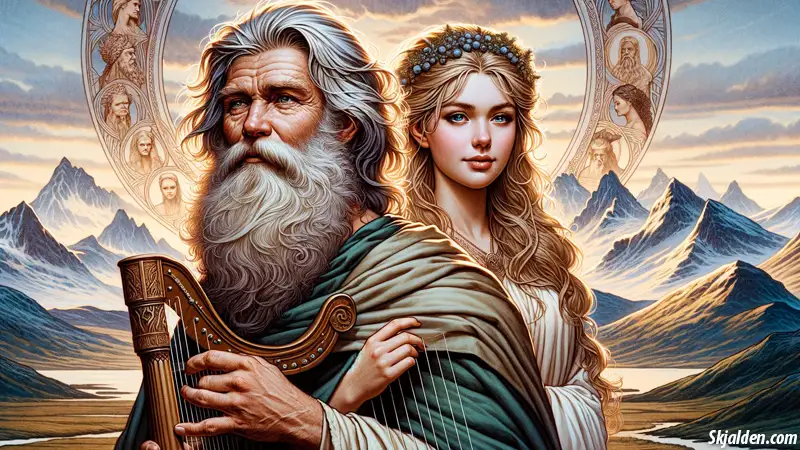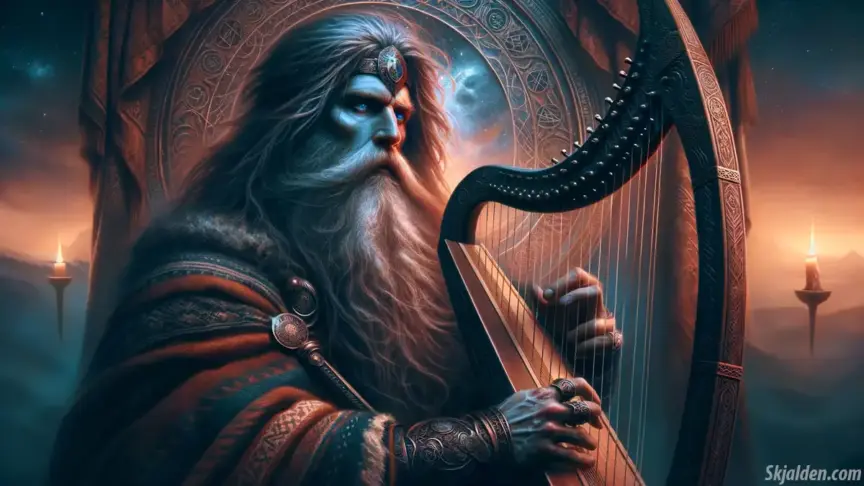Within the rich tapestry of Norse mythology, Bragi stands out with a quiet yet profound presence. Known as the God of poetry and music, Bragi’s essence lies in the art of storytelling and song, a craft that held immense importance in Viking culture. As the son of Odin, the Allfather, and the giantess Gunnlod, Bragi is a bridge between the divine and the jötnar, the known and the mysterious.
His wisdom is legendary; his words, are a cascade of creativity that can soothe warriors and inspire bards. Bragi’s name itself is a testament to his domain, originating from ‘Bragr,’ the Old Norse word for poetry. The Vikings revered their poets, known as bragamen or bragawoman, as keepers of lore and weavers of words.
Bragi’s physical depiction is as unique as his role in the pantheon. He is often imagined with an impressively long beard, a symbol of his age and experience. Yet, the most striking and enigmatic attribute is the runes carved upon his tongue—a detail that illustrates his mastery over the magical and evocative power of words. In his union with Idun, the goddess of youth, Bragi finds a perfect counterpart. Together, they reside in Asgard, embodying the eternal link between wisdom and rejuvenation.
Bragi in Valhalla: The Eternal Bard
Within the walls of Valhalla, Bragi’s role is clear: he is the bard, the þulr, whose voice transcends mortal bounds. He entertains the einherjar, heroes who have earned their place in Odin’s hall, with tales of valor and heroism. His welcoming of fallen warriors is not just an honor but a rite that affirms their place amongst the legends of the old. The image of Bragi with runes on his tongue, reciting poetry that could move the heavens and the earth, is a powerful symbol of the spoken word’s ability to immortalize and inspire.

Bragi’s Divine Legacy
The legacy of Bragi is not merely mythical; it is anchored in history. Bragi Boddason, the renowned poet of the ninth century, lent his name to the divine Bragi. His poetic works were so profound that they echoed through the ages, leading to the belief that upon his death, he was appointed by Odin himself as Valhalla’s bard. It was a fitting role, for who better to recount the valor of kings and warriors than a poet whose skill had won the favor of the legendary Ragnar Lodbrok?
The medieval Old Norse writers, influenced by Christian perspectives, elevated Bragi’s stature further, envisioning him as nothing less than the god of poetry. This divine attribution is a testament to the profound respect the Norse had for the art of poetry—a craft they believed could only be overseen by a deity. Bragi’s marriage to Idun, with her life-giving fruits, symbolizes the nourishment of the soul through art and the eternal nature of the gods’ wisdom and creativity.
Through the legacy of Bragi, we see the Norse culture’s deep reverence for poetry and music. He embodies the intellectual and artistic pursuits that were as vital to the Vikings as their physical endeavors. Bragi’s story, with its historical echoes and mythological grandeur, continues to captivate those who seek the wisdom of the past to understand the perennial power of words and music.
